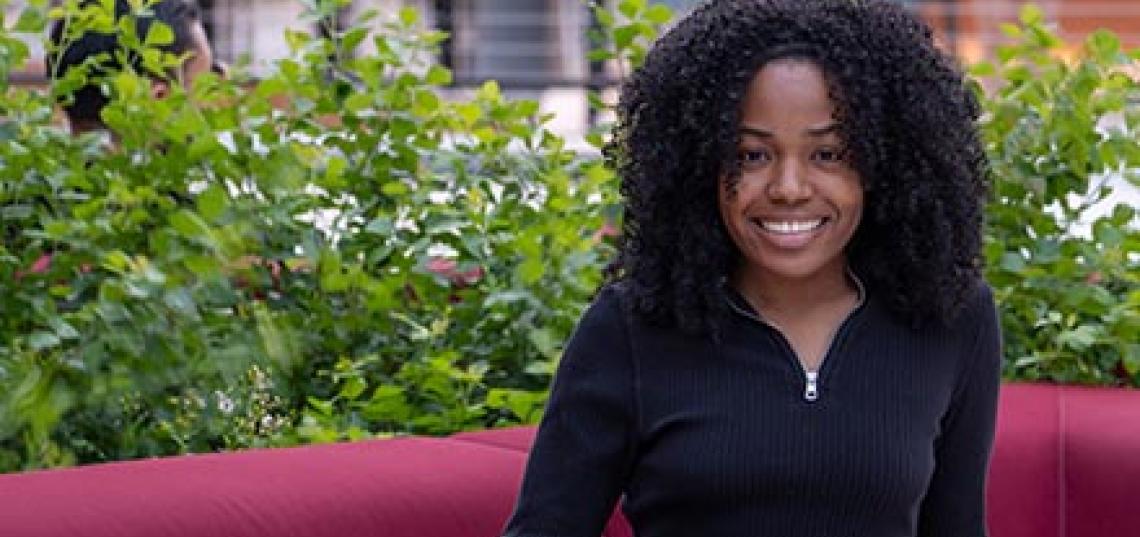
Akia Thorpe JMS’17 is living proof that a single class at SC&I can inspire an entire career. Thorpe’s journey to documentary filmmaking began at Rutgers University, where she majored in Journalism and Media Studies and minored in Digital Communication, Information, and Media (DCIM) at the Rutgers School of Communication and Information.
It was by taking a Documentary Filmmaking course taught by Associate Professor of Journalism and Media Studies Khadijah Costley White that Thorpe discovered her passion and gained the practical skills that would lay the blueprint for her professional life.
“Every component of our coursework ended up applying to my work as an intern and as a full-time producer,” she recalls her early days as an intern for Florentine Films — the award-winning production company of renowned American documentary filmmaker Ken Burns, whose impactful historical documentaries have earned 16 Emmys, 2 Academy Award nominations, and a 2024 Liberty Medal. That foundational experience set Thorpe on a trajectory toward a thriving career in documentary production, all with the same company where she got her start.
Thorpe joined Florentine Films in 2019 as a Production Coordinator and now serves as an Associate Producer, helping bring history to life on the big screen — from the knockout film Muhammad Ali (2021) to the documentary Leonardo da Vinci (2024).
Currently, she’s immersed in Emancipation to Exodus, an ambitious, eight-hour film covering Emancipation, Reconstruction, and the Jim Crow era, through to the Great Migration—set to air on PBS in 2028. It’s a project of epic scope, but for Thorpe, managing such complexity has become second nature—another testament to the skills she first honed at SC&I.
Thorpe joined Florentine Films in 2019 as a Production Coordinator and now serves as an Associate Producer, helping bring history to life on the big screen — from the knockout film Muhammad Ali (2021) to the documentary Leonardo da Vinci (2024).
Day in the Life of a Documentary Filmmaker
In the world of documentary production, Thorpe said no two days are alike. Her typical day depends on the project phase. “If we’re in the swing of production, you can find me researching potential interview subjects, coordinating logistics for interview shoots, and scouting interview locations online and in person,” Thorpe details.
During this phase, Thorpe is diving into research, including historical sources relating to the film, and archival materials such as photos or footage clips. She catalogs all this found media in an organizing software known as FileMaker, ensuring every frame is accounted for.
As a project moves toward its final cut, her focus switches to licensing stills, music, and footage as well as collaborating with directors, editors, and the archive teams in weekly meetings, and conducting routine fact-checking required during and at the end of every film. In short, she’s the glue that holds the story together, blending meticulous organization with creative vision.
Office Hours to Opportunities: SC&I’s Professors and Mentorship
Thorpe still remembers the moment she realized just how much her time at Rutgers had prepared her for the real world of documentary filmmaking. On one of her first days on set with Florentine Films, she found herself instinctively stepping into roles she hadn’t realized she already knew how to do.
“I had all the building blocks already, so all I really needed was more experience to build my skills and confidence,” Thorpe says, thankful that Rutgers’ JMS course requirements naturally pushed her to learn different skills.
It was a full-circle moment—proof that the groundwork laid at Rutgers had quietly prepared her to thrive in one of the most respected documentary film companies in the world.
Thorpe still remembers the moment she realized just how much her time at Rutgers had prepared her for the real world of documentary filmmaking. On one of her first days on set with Florentine Films, she found herself instinctively stepping into roles she hadn’t realized she already knew how to do.
“Reel” Advice - Why You Should Choose SC&I
When asked what advice she would give to prospective SC&I students, Thorpe doesn’t mince words. “Pay attention and take advantage of having a program that can give you real-world experience — offering quality equipment, software, and connections!” she says.
Thorpe credits the varied curriculum at SC&I, which supports students who are still finding their footing. “Don’t count out courses on the premise that you don’t need it. It’ll surprise you how much overlap there is in journalistic skills across the board, whether you’re an on-air reporter, writer, or documentary producer.”
Thorpe also stresses the value of mentorship, emphasizing the approachability and sincerity of Rutgers professors, who she described as accomplished and well-connected professionals eager to help students grow both personally and professionally. “Whether it’s seeking advice on your class project, a personal project, or post-graduation. Rutgers professors are well-established and connected real-world professionals, and they want to make you the best version of yourself.”
Final Cut, First Steps: Job Search Post-Graduation
For students who feel daunted by job postings demanding years of experience, Thorpe offers a reminder to trust the value of their efforts. “I would tell students to not forget that the work they did during their four years at Rutgers will be meaningful when applying to jobs,” she says. “Do as much as you can and put your heart into your work—whether it’s for class or an outside internship.”
SC&I is the place where one class, one professor, and one moment of curiosity can change everything, as it did for Thorpe, leading her to a thriving career at one of the most respected film companies in the world. Thorpe proves that greatness is built on heart, hustle, and history—and SC&I helps ignite all three.
Learn more about the Journalism and Media Studies major at the Rutgers School of Communication and Information on the website.
